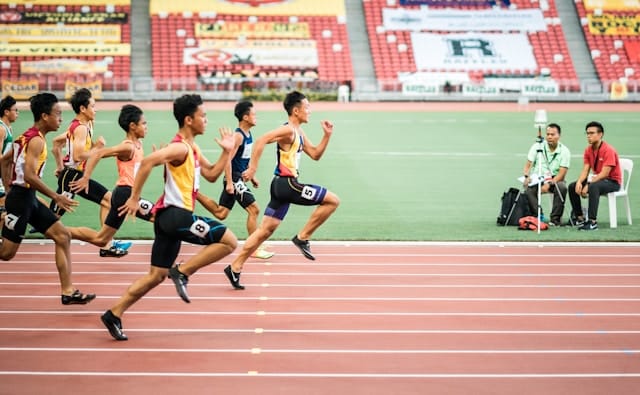Emotional resilience is a critical trait needed by athletes. It is the ability to maintain mental toughness and bounce back from the adversities of competitive sports. Athletes frequently face the pressure of performing at a high level, and failures may often lead to feelings of disappointment, stress, and anxiety. This article aims to shed light on how athletes can develop emotional resilience in the face of competitive failures.
Understanding the Importance of Emotional Resilience in Sports
Before we delve into the strategies for developing emotional resilience, it is crucial to understand its importance in sports. Competitive sports are not just physically demanding; they also require a heavy mental toll. Athletes face the pressure of winning, maintaining a performance level, dealing with injuries, and coping with the highs and lows of their career. All these factors can lead to an array of emotions, from exhilaration to despair.
Sujet a lire : How to Use Technology for Real-Time Feedback in Track and Field Training?
Emotional resilience is the capacity to handle this emotional roller-coaster effectively. Athletes with high emotional resilience can cope with the stress, recover quickly from setbacks, and maintain a positive outlook. More importantly, they can use their experiences, both positive and negative, to foster personal growth and improve their performance. Ultimately, emotional resilience can help athletes sustain a long, fulfilling, and successful sports career.
Building Emotional Resilience: Strategies and Techniques
Developing emotional resilience is not an overnight process. It requires commitment, practice, and the right strategies. Here are some effective techniques that athletes can use to strengthen their emotional resilience.
A lire en complément : What Are the Key Factors in Developing a Comprehensive Athlete Wellness Program?
1. Mental Toughness Training
Mental toughness is a key component of emotional resilience. It refers to an athlete’s ability to maintain focus, determination, and confidence in the face of adversity. Athletes can enhance their mental toughness through cognitive-behavioral techniques, such as goal setting, self-talk, and visualization. These strategies can help athletes reframe negative thoughts, boost their confidence, and improve their performance under pressure.
2. Stress Management Techniques
Stress is an inevitable part of competitive sports, and managing it effectively is crucial for developing emotional resilience. Athletes can use various stress management techniques, like deep breathing exercises, progressive muscle relaxation, and meditation. These methods can help athletes calm their mind, reduce their anxiety, and maintain their concentration during high-pressure situations.
3. Emotional Intelligence Training
Emotional intelligence involves understanding and managing one’s emotions. Athletes with high emotional intelligence can recognize their feelings, control their emotional reactions, and respond appropriately to the emotions of others. Emotional intelligence training can include activities such as journaling, role-playing, and empathy exercises. These activities can help athletes become more aware of their emotions and deal with them more effectively.
4. Support Networks
Support networks play a crucial role in fostering emotional resilience. Athletes can lean on their coaches, teammates, family, and friends for emotional support during tough times. These individuals can provide encouragement, advice, and a listening ear, helping athletes cope with their emotions and bounce back from setbacks.
Dealing with Failure: Turning Setbacks into Opportunities
Failure is a part of every athlete’s journey, and dealing with it appropriately is vital for building emotional resilience. Instead of viewing failure as a setback, athletes should see it as an opportunity for growth and improvement.
When faced with failure, athletes should first acknowledge their emotions. It is natural to feel disappointed, frustrated, or upset after a loss or a poor performance. However, athletes should not dwell on these negative feelings. Instead, they should accept them, process them, and then let them go.
Next, athletes should analyze the situation objectively. They should identify what went wrong, what they could have done differently, and what they can learn from the experience. By doing so, athletes can turn their failures into valuable lessons, which can help them improve their future performances.
Lastly, athletes should maintain a positive mindset. Instead of focusing on their failures, they should focus on their strengths, their progress, and their potential for improvement. A positive mindset can help athletes stay motivated, persevere through challenges, and build their emotional resilience.
Fostering a Resilience Culture in Sports
Building emotional resilience is not just the responsibility of the athletes; it is also the responsibility of the coaches, the teams, and the sports organizations. By fostering a resilience culture in sports, these stakeholders can provide a supportive environment where athletes can develop their emotional resilience effectively.
Coaches can cultivate a resilience culture by promoting positive coaching methods. Instead of criticizing athletes for their mistakes, coaches should provide constructive feedback and encourage athletes to learn from their errors. Coaches should also support athletes emotionally, helping them deal with their feelings and boosting their confidence.
Teams and sports organizations can contribute by providing resources and services for mental health and resilience training. They can offer workshops, counseling services, and support groups where athletes can learn resilience skills and share their experiences. These initiatives can help athletes manage their emotions, deal with the pressures of sports, and build their emotional resilience in a supportive community.
In conclusion, emotional resilience is not just about surviving the challenges of competitive sports; it’s about thriving in the face of adversity. With the right strategies and a supportive environment, athletes can enhance their emotional resilience, turn their failures into opportunities, and achieve their full potential in their sports careers.
The Role of Resilience in Overcoming Performance Anxiety
Performance anxiety is a common experience among athletes. The pressure to perform well, coupled with the fear of failure, can often lead to high levels of stress and anxiety. However, athletes who possess a strong sense of emotional resilience can effectively navigate these challenging emotions and maintain their performance levels.
Performance anxiety can manifest itself in various ways, such as nervousness, racing thoughts, or physical symptoms like increased heart rate and heavy breathing. These symptoms can interfere with an athlete’s ability to perform and may result in poor performance or even failure.
Building emotional resilience allows athletes to recognize and understand these symptoms as a normal response to stress. More importantly, it equips them with the tools to manage these symptoms effectively, ensuring that they do not interfere with their performance.
Techniques such as mindfulness and cognitive-behavioral therapy can be particularly effective in managing performance anxiety. Mindfulness encourages athletes to stay present and focused, reducing the likelihood of being consumed by worries about past failures or future performances. Cognitive-behavioral therapy, on the other hand, helps athletes challenge and reframe negative thoughts, promoting a more positive and confident mindset.
Moreover, incorporating regular physical activities, maintaining a balanced diet, and ensuring adequate sleep can also contribute to an athlete’s overall emotional resilience, helping them manage performance anxiety effectively.
Conclusion: The Power of Emotional Resilience in Sports
In conclusion, emotional resilience is indeed a powerful tool in an athlete’s arsenal. The ability to rebound from failures, manage stress, and cope with the emotional demands of competitive sports is what sets resilient athletes apart from the rest.
Developing emotional resilience is not a quick process; it takes time, effort, and a lot of patience. However, the benefits are well worth the investment. From enhancing performance to improving mental health, emotional resilience is truly transformative.
It is important to remember that emotional resilience is not about eliminating negative emotions or failures. Instead, it’s about acknowledging these experiences, learning from them, and using them as stepping stones towards personal growth and improved performance.
Moreover, the responsibility of fostering emotional resilience does not fall solely on the athlete. Coaches, teams, and sports organizations should also play an active role in creating a supportive environment that encourages emotional resilience.
To all athletes out there: Remember, your failures do not define you. It’s how you respond to them that truly matters. So, embrace your emotions, learn from your failures, and keep pushing forward. That is the power of emotional resilience. And remember, you are more resilient than you think.











